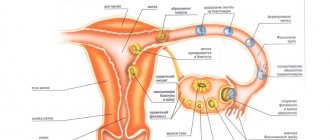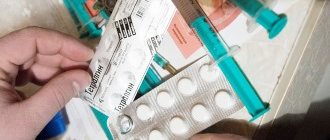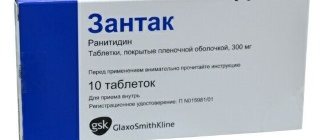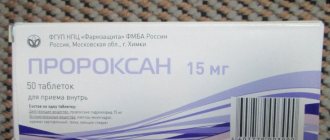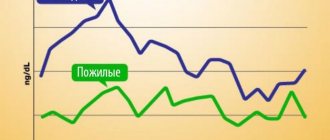Write a review
Reviews: 0
Manufacturers: Grindeks
Active ingredients
- Sulpiride
Disease class
- Delirium not caused by alcohol or other psychoactive substances
- Schizophrenia
- Depressive episode
- Other neurotic disorders
- Meniere's disease
- Vestibular neuronitis
- Other peripheral dizziness
- Dizziness of central origin
- Cerebrovascular disease, unspecified
- Stomach ulcer
- Duodenal ulcer
- Irritable bowel syndrome
- Intracranial trauma
- Consequences of intracranial injury
Clinical and pharmacological group
- Not indicated. See instructions
Pharmacological action
- Antidepressant
- Neuroleptic
- Antipsychotic
Pharmacological group
- Neuroleptics
Release form and composition
The drug is available in film-coated tablets: round, biconvex, white (30 pieces in plastic bottles, 1 bottle in a cardboard box and instructions for use of Betamax).
Active substance: sulpiride, 1 tablet – 50 mg, 100 mg or 200 mg.
Additional components of the tablets:
- excipients: microcrystalline cellulose, crospovidone, magnesium stearate, corn starch, povidone;
- shell composition: carnauba wax, Opadry white dye 33G28707 (titanium dioxide, macrogol 3000, lactose monohydrate, triacetin, hypromellose).
Analogs
Level 4 ATX code matches:
Solian
Tiapridal
Prosulpin
Tiapride
Sulpiride
Eglonil
Eglek , Sulpirid , Eglonil , Sulpirid, Belupo , Vero-Sulpirid , Depral , Dogmatil , Sulpiril .
Pharmacological properties
Pharmacodynamics
The active substance of Betamax, sulpiride, is an atypical antipsychotic drug (neuroleptic) with antidepressant, stimulant and antiemetic effects.
The antipsychotic effect is due to the ability to block dopamine D2 receptors of the mesolimbic and mesocortical systems. It appears when using daily doses of more than 600 mg. In doses up to 600 mg per day, sulpiride has a predominantly antidepressant and stimulating effect.
Betamax stimulates the secretion of prolactin. Does not have a significant effect on histamine, cholinergic, adrenergic, serotonin and GABA receptors.
The antiemetic effect of sulpiride is due to its ability to block dopamine D2 receptors in the trigger zone of the vomiting center.
The peripheral effect is explained by inhibition of presynaptic receptors.
In case of gastric and duodenal ulcers, sulpiride has a selective effect on the hypothalamus, as a result of which it suppresses the excitation of the centers of the sympathetic nervous system, increases the secretion of mucus in the stomach, improves the blood supply to the stomach and the proliferation of capillaries in the tissues, accelerates the proliferation of granulation tissue and forms regenerated epithelium.
Pharmacokinetics
After taking Betamax orally, the maximum plasma concentration of sulpiride is 0.73 mg/l and is achieved within 3–6 hours.
Biological activity – 25–35%. Approximately 40% of the substance is bound to plasma proteins. It penetrates quickly into the kidneys and liver, and more slowly into brain tissue (accumulates mainly in the pituitary gland). Excreted in breast milk (0.1% of the daily dose).
In the central nervous system, the concentration of the drug is 2–5% of the plasma level.
Total clearance – 126 ml/min.
Sulpiride is not metabolized. It is excreted almost unchanged by the kidneys by glomerular filtration (92%).
The half-life is approximately 7 hours. In case of moderate and severe renal failure, this value increases significantly (up to 20–26 hours after intravenous administration), so a reduction in the dose of the drug and/or an increase in the interval between doses is required.
Betamax oral tablets
Instructions for medical use of the drug
Description of pharmacological action
The peripheral effect of the drug is based on the inhibition of presynaptic receptors (improvement in mood is associated with an increase in the amount of dopamine in the central nervous system, and the development of symptoms of depression is associated with a decrease). The antipsychotic effect of the drug is manifested in doses of more than 600 mg per day, stimulating and antidepressant - in doses of up to 600 mg per day. In small doses it can be used as an adjuvant in the treatment of psychosomatic diseases, incl. to relieve negative mental symptoms of gastric and duodenal ulcers. In case of irritable bowel syndrome, it reduces the intensity of abdominal pain and leads to an improvement in the patient’s clinical condition. Low doses (50–300 mg per day) are effective for dizziness, regardless of etiology. Stimulates the secretion of prolactin and has a central antiemetic effect (suppression of the vomiting center).
Indications for use
Schizophrenia (acute and chronic), delirium, depression, neurosis, dizziness, incl. for vertebrobasilar insufficiency, vestibular neuritis, Meniere's disease, traumatic brain injury, otitis media. Peptic ulcer of the stomach and duodenum and irritable bowel syndrome (as an adjuvant therapy).
Release form
film-coated tablets 50 mg; plastic bottle (bottle) 30, cardboard pack 1; film-coated tablets 100 mg; plastic bottle (bottle) 30, cardboard pack 1; film-coated tablets 200 mg; plastic bottle (bottle) 30, cardboard pack 1; Composition Film-coated tablets, 1 tablet. sulpiride 50 mg, 100 mg, 200 mg in plastic bottles of 30 pcs.
Pharmacodynamics
The peripheral effect of the drug is based on the inhibition of presynaptic receptors (improvement in mood is associated with an increase in the amount of dopamine in the central nervous system, and the development of symptoms of depression is associated with a decrease). The antipsychotic effect of the drug is manifested in doses of more than 600 mg per day, stimulating and antidepressant - in doses of up to 600 mg per day. In small doses it can be used as an adjuvant in the treatment of psychosomatic diseases, incl. to relieve negative mental symptoms of gastric and duodenal ulcers. In case of irritable bowel syndrome, it reduces the intensity of abdominal pain and leads to an improvement in the patient’s clinical condition. Low doses (50–300 mg per day) are effective for dizziness, regardless of etiology. Stimulates the secretion of prolactin and has a central antiemetic effect (suppression of the vomiting center).
Pharmacokinetics
After oral administration, Cmax is achieved within 1.5–3 hours. Bioavailability is 27%. Plasma protein binding is less than 40%. The concentration in the central nervous system is 2–5% of the plasma concentration. Excreted in breast milk. Not metabolized. It is excreted predominantly unchanged by the kidneys. In patients with moderate and severe renal failure, T1/2 increases and is 20–26 hours (after IV administration).
Use during pregnancy
Not recommended during pregnancy, unless the expected effect outweighs the potential risk to the fetus. Breastfeeding should be stopped during treatment.
Use for renal impairment
The drug should be used with caution in patients with impaired renal function (since up to 95% of sulpiride is excreted by the kidneys).
Other special occasions at reception
The drug should be used with caution in case of liver failure.
Contraindications for use
Hypersensitivity; acute poisoning with alcohol, hypnotics, analgesics; hypertension stage II-III; pheochromocytoma, epilepsy; hyperprolactinemia; state of affect and aggression, period of breastfeeding, childhood (up to 14 years).
Side effects
From the nervous system and sensory organs: drowsiness, dizziness, sedation, rarely - extrapyramidal syndrome, dyskinesia, oral automatism, aphasia, agitation, sleep disorder, very rarely - neuroleptic malignant syndrome. From the cardiovascular system and blood (hematopoiesis, hemostasis): increased blood pressure, rarely - orthostatic hypotension. From the gastrointestinal tract: dry mouth, heartburn, vomiting, constipation. Metabolism: reversible hyperprolactinemia (galactorrhea, menstrual irregularities, rarely - gynecomastia, impotence, frigidity). Allergic reactions: skin rash, itching. Other: hyperthermia, increased sweating, weight gain.
Directions for use and doses
Orally, in the first half of the day (before 16 hours), due to an increase in the level of wakefulness. The maximum daily dose is 1600 mg. Schizophrenia, delirious psychosis: initial dose - 600–1200 mg per day, in several doses; maintenance - 300–800 mg per day. Depression: from 150–200 mg to 600 mg per day in several divided doses. Dizziness: 150–200 mg/day, in severe conditions – up to 300–400 mg/day. The course of treatment is at least 14 days. Peptic ulcer of the stomach and duodenum, irritable bowel syndrome as an adjuvant therapy: 100–300 mg per day in 1–2 doses. Elderly patients: initial dose - 1/4–1/2 dose for adults. Children over 14 years of age: 3–5 mg/kg. When creatinine Cl is 30–60 ml/min, the dose is 70% of the standard dose or the interval between doses is increased by 1.5 times; with creatinine Cl 10–30 ml/min - 50% or 2 times; less than 10 ml/min - 34% or 3 times (reducing the dose or increasing the interval between doses, respectively).
Overdose
Symptoms: blurred vision, arterial hypertension, sedation, nausea, extrapyramidal disorders, dry mouth, vomiting, increased sweating, gynecomastia. Treatment: symptomatic therapy.
Interactions with other drugs
Strengthens the sedative effect of narcotic analgesics, antihistamines, barbiturates, benzodiazepines and other anxiolytics, alcohol. Concomitant administration of levodopa should be avoided (mutual antagonism). When taken simultaneously with antihypertensive drugs, the risk of developing orthostatic hypotension increases.
Precautions for use
Prescribe with caution to patients with impaired renal function, heart and blood vessel diseases, parkinsonism and young women with irregular menstrual cycles. If hyperthermia develops, the drug should be discontinued. It is recommended to take in the first half of the day (before 16:00) due to the increased level of wakefulness. Should not be used during work by vehicle drivers and people whose profession involves increased concentration of attention. You should not drink alcohol during treatment.
Special instructions for use
If hyperthermia occurs during treatment, the drug should be discontinued (hyperthermia is a symptom of the development of NMS). When prescribing the drug to patients with epilepsy, it is necessary to conduct a preliminary clinical and electrophysiological examination before starting treatment, because the drug lowers the threshold for seizure activity. When used simultaneously with drugs that increase the risk of developing ventricular arrhythmias, regular ECG monitoring is recommended. Prolongation of the QT interval when using the drug Betamax is a dose-dependent effect. The use of ethanol while taking the drug is contraindicated. Impact on the ability to drive vehicles and machinery During treatment, patients must be careful when driving vehicles and engaging in other potentially hazardous activities that require increased concentration and speed of psychomotor reactions.
Storage conditions
List B.: In a dry place, at a temperature not exceeding 25 °C.
Best before date
24 months
ATX classification:
N Nervous system
N05 Psycholeptics
N05A Antipsychotic drugs
N05AL Benzamides
N05AL01 Sulpiride
Indications for use
Betamax tablets are prescribed as monotherapy or in combination with other drugs from the group of psychotropic drugs for the following diseases:
- Schizophrenia (acute and chronic);
- Depression of various origins;
- Acute delirious states (stupefaction, hallucinations, impaired self-awareness and disorientation in time and location, often observed in people after operations (anesthesia), with chronic alcoholism, after heart attacks and severe intoxications);
- Neuroses;
- Migraine;
- Dizziness with vertebrobasilar insufficiency, vestibular neuritis, Meniere's disease, otitis media;
- Gastric and duodenal ulcers, irritable bowel syndrome (as an adjuvant).
Contraindications
- Hypersensitivity to Betamax components;
- Acute form of poisoning with alcohol, sleeping pills, analgesics;
- Hypertonic disease;
- Epilepsy;
- Hyperprolactinemia;
- Pheochromocytoma;
- State of affect and aggression;
- Breastfeeding period;
- Age up to 18 years.
Betamax should be used with caution in the following cases: predisposition to the development of hypokalemia or cardiac arrhythmia (with bradycardia < 55 beats per minute, hypokalemia, congenital prolongation of the QT interval, concomitant use of drugs that can cause the development of severe bradycardia), slowing of intracardiac conduction or prolongation QT interval, history of neuroleptic malignant syndrome, presence of risk factors for stroke, Parkinson's disease, intestinal obstruction, diabetes mellitus or presence of risk factors for diabetes mellitus, renal failure, presence of risk factors for development of agranulocytosis, leukopenia, thromboembolism or neutropenia, epilepsy or seizure disorder history, aggressive behavior or agitation with impulsivity, old age, pregnancy (the use of Betamax during this period of a woman’s life is permissible only in cases where the effect of therapy outweighs the risk to the fetus), simultaneous use of medications containing ethanol.
special instructions
Use with caution in patients with parkinsonism and the elderly. In case of severe renal failure, a dose reduction or an intermittent course of treatment is recommended. In patients with epilepsy, a preliminary clinical and electrophysiological examination should be carried out before starting therapy, because sulpiride lowers the threshold of convulsive readiness. In the event of hyperthermia, which is one of the elements of NMS, sulpiride should be discontinued immediately. Avoid drinking alcohol during the treatment period. Use with caution in children. Impact on the ability to drive vehicles and operate machinery
During the treatment period, you should refrain from engaging in potentially hazardous activities that require increased attention and rapid psychomotor reactions.
Betamax, instructions for use: method and dosage
Betamax should be taken no later than 16:00. The dosage of the drug depends on the diagnosis and is determined individually by the attending physician.
For schizophrenia or delirious psychosis, the initial dose of Betamax is from 600 to 1200 mg per day, divided into several doses, with maintenance therapy - from 300 to 800 mg per day.
For depression, Betamax is taken 150-200 mg per day (maximum 600 mg), dividing the dose into several doses, for neuroses - 400-600 mg per day.
For dizziness, the drug is taken 150-200 mg per day (in severe cases - 300-400 mg), for migraines - 100-300 mg per day.
When including a drug in complex therapy for diseases of the gastrointestinal tract, Betamax is prescribed 150 mg per day in 3 doses. Duration of therapy is 1-1.5 months.
The daily dose of the drug for elderly patients is ¼-½ of the usual adult dose.
Betamax price, where to buy
You can buy it in many pharmacies in Moscow with a doctor’s prescription. The estimated cost of 100 mg tablets No. 30 is from 240 rubles. up to 297 rubles, and 200 mg tablets No. 30 from 299 rubles. up to 353 rub.
- Online pharmacies in UkraineUkraine
- Online pharmacies in KazakhstanKazakhstan
Pharmacy24
- Betamax 200 mg N30 tablets AT "Grindeks", Latvia
219 UAH. order - Betamax 100 mg N30 tablets AT "Grindeks", Latvia
164 UAH order
- Betamax 50 mg N30 tablets AT "Grindeks", Latvia
122 UAH order
show more
Side effects
- from the nervous system: akathisia, acute dyskinesia and acute muscular dystonia (trismus, torticollis, spasm, oculogyric crisis), extrapyramidal disorders and related disorders, including parkinsonism (muscle hypertonicity, hypersalivation, hypokinesia, tremor) - these symptoms are usually , undergo reverse development with the combined use of anticholinergic antiparkinsonian drugs; insomnia or drowsiness, sedation, tardive dyskinesia (stereotypical involuntary rhythmic movements, mainly of the tongue and/or facial muscles; usually occurs after 3 or more months of taking Betamax, while antiparkinsonian drugs are ineffective and can even increase symptoms), seizures, neuroleptic malignant syndrome;
- from the organs of vision: blurred visual perception;
- from the immune system: hypersensitivity reactions (exfoliative dermatitis, maculopapular rash, urticaria, pigmentation, photosensitivity);
- from the digestive system: dry mouth, constipation;
- on the part of metabolism and nutrition: weight gain, hyperglycemia;
- from the hematopoietic organs and lymphatic system: leukopenia, agranulocytosis, neutropenia;
- from the endocrine system: hyperprolactinemia;
- from the liver and biliary tract: increased activity of microsomal liver enzymes, jaundice;
- from the cardiovascular system: prolongation of the QT interval, ventricular arrhythmias (ventricular tachycardia of the “pirouette” type), arterial hypertension or hypotension, orthostatic hypotension, ventricular tachycardia (can lead to the development of ventricular fibrillation, cardiac arrest, sudden death), thromboembolism (including pulmonary embolism, deep vein thrombosis);
- on the part of the genital organs and mammary glands: disorders associated with hyperprolactinemia (enlargement and tenderness of the mammary glands, gynecomastia, amenorrhea, galactorrhea, erectile dysfunction, orgasmic dysfunction);
- pregnancy, postpartum period and neonatal period: drug withdrawal syndrome in newborns whose mothers took Betamax in the third trimester of pregnancy.
If therapy is suddenly stopped, withdrawal syndrome may develop: increased sweating, nausea, vomiting, voluntary movements (dystonia, akathisia, dyskinesia), insomnia, recurrence of psychotic symptoms.
Overdose
Information on overdose of sulpiride is limited. There are no specific symptoms, the following disorders are possible: trismus, tongue protrusion, dyskinesia with specific torticollis, parkinsonism syndrome, coma.
No antidote has been established. Symptomatic and supportive therapy is indicated. It is necessary to carefully monitor respiratory function and cardiac activity until the patient recovers completely. In the case of the development of severe extrapyramidal syndrome, m-anticholinergic drugs (for example, biperiden) are used. If necessary, hemodialysis is performed (allows sulpiride to be partially removed from the body).
For impaired renal function
Betamax should be used with caution in renal failure. A reduction in the dose of the drug and/or an increase in the intervals between doses is required, which depends on the creatinine clearance (CC):
- CC 30–60 ml/min: reduce the dose by 30% and increase the intervals between doses by 1.5 times;
- CC 10–30 ml/min: reduce the dose by 50% and increase the intervals between doses by 2 times;
- QC < 10 ml/min: reduce the dose by 70% and increase the intervals between doses by 3 times.
Drug interactions
Due to the mutual antagonism of the effects, Betamax is contraindicated for use in combination with dopamine receptor agonists (rotigotine, kinagolide, cabergoline) and levodopa.
The simultaneous use of the following drugs is not recommended: ethanol (the sedative effect of sulpiride is enhanced), drugs that can cause torsades de pointes or prolong the QT interval [class IA antiarrhythmics (disopyramide, quinidine), potassium-removing diuretics, laxatives that stimulate intestinal motility , glucocorticosteroids, digitalis preparations, beta-blockers, guanfacine, diltiazem, verapamil, clonidine, tetracosactide, amphotericin B intravenously, class III antiarrhythmic drugs (sotalol, amiodarone), other drugs such as oral antibiotics, antidepressants, lithium preparations, imipramine derivatives, thioridazine, sultopride, pimozide, bepridil, methadone, cisapride, haloperidol, intravenous vincamine and erythromycin, sparfloxacin, pentamidine, halofantrine]. If the simultaneous administration of these drugs is clinically justified, electrocardiographic monitoring and careful clinical and laboratory (blood electrolyte composition) monitoring should be carried out.
Interactions to consider:
- antihypertensive drugs: there is an increase in the hypotensive effect, the risk of developing orthostatic hypotension increases;
- drugs that depress the central nervous system (antidepressants, antihistamines, narcotic analgesics, barbiturates, sedative H1-histamine receptor blockers, benzodiazepines and other anxiolytics, clonidine and other centrally acting antihypertensives): possible cumulative depression of the functions of the central nervous system and decreased response ;
- antacids, sucralfate: absorption of sulpiride is reduced, so it is necessary to maintain a minimum interval between doses (2 hours);
- ropinirole: mutual antagonism is noted;
- Lithium preparations: the risk of developing extrapyramidal disorders increases.
Interaction
Sulpiride enhances the sedative effect of barbiturates , benzodiazepines , narcotic analgesics, alcohol and antihistamines.
With the simultaneous administration of Levodopa, mutual antagonism is observed - the effectiveness decreases.
There is a risk of orthostatic hypotension when antihypertensive drugs .
Antacids , sucralfate , drugs containing magnesium and aluminum reduce the bioavailability of the drug.
There is antagonism with neuroleptics and dopamine receptor agonists ( apomorphine , bromocriptine , amantadine , entacapone , lisuride , cabergoline , piribedil , pramipexole , pergolide , ropinirole , quinagolide ). If extrapyramidal syndrome has developed, anticholinergic drugs are prescribed.
Ventricular ari can develop when using:
- with class IA and III antiarrhythmic drugs, neuroleptics ( Haloperidol , Droperidol , Thioridazine , Chlorpromazine , Cyamemazine , Amisulpride , Levomepromazine , Trifluoperazine , Tiapride );
- with medications that cause bradycardia ( Clonidine , Guanfacine , Diltiazem , digitalis preparations, Donepezil , Verapamil , beta-blockers, Rivastigmine , Tacrine , Pyridostigmine , Neostigminam , benonia chloride, Galantamine );
- with medications that cause hypokalemia (diuretics, laxatives, corticosteroids, Amphotericin B , Tetracosactide ).
When used simultaneously with the dopamine receptor blocker sultopride, ventricular arrhythmias increases .
Reviews of Betamax
Reviews about Betamax are mostly positive. The drug is effective for depression, neuroses, panic attacks, as well as peptic ulcers, cholecystitis and colitis. Patients note that the drug effectively eliminates both psychosomatic disorders and dyspeptic disorders, normalizes the motility of the stomach, intestines and gall bladder, and is well tolerated.
Side effects include decreased blood pressure, increased appetite and increased body weight, the appearance of edema, increased prolactin levels, sleep disturbances, and extrapyramidal disorders.
Similar drugs:
- Eglonil Oral tablets
- Finlepsin Oral tablets
- Moditen depo Solution for intramuscular administration
- Egolanza Oral tablets
- Rispaksol Oral tablets
- Thiodazine Oral tablets
- Closasten (Closastene) Oral tablets
- Clopixol Depot Solution for intramuscular administration
- Thioridazine Oral tablets
- Leponex Oral tablets
** The Drug Directory is intended for informational purposes only. For more complete information, please refer to the manufacturer's instructions. Do not self-medicate; Before you start using Betamax, you should consult a doctor. EUROLAB is not responsible for the consequences caused by the use of information posted on the portal. Any information on the site does not replace medical advice and cannot serve as a guarantee of the positive effect of the drug.
Are you interested in Betamax? Do you want to know more detailed information or do you need a doctor's examination? Or do you need an inspection? You can make an appointment with a doctor - the Euro lab is always at your service! The best doctors will examine you, advise you, provide the necessary assistance and make a diagnosis. You can also call a doctor at home . Euro lab clinic is open for you around the clock.
** Attention! The information presented in this medication guide is intended for medical professionals and should not be used as a basis for self-medication. The description of the drug Betamax is provided for informational purposes and is not intended for prescribing treatment without the participation of a doctor. Patients need to consult a specialist!
If you are interested in any other drugs and medications, their descriptions and instructions for use, information about the composition and form of release, indications for use and side effects, methods of use, prices and reviews of drugs, or you have any other questions and suggestions - write to us, we will definitely try to help you.
